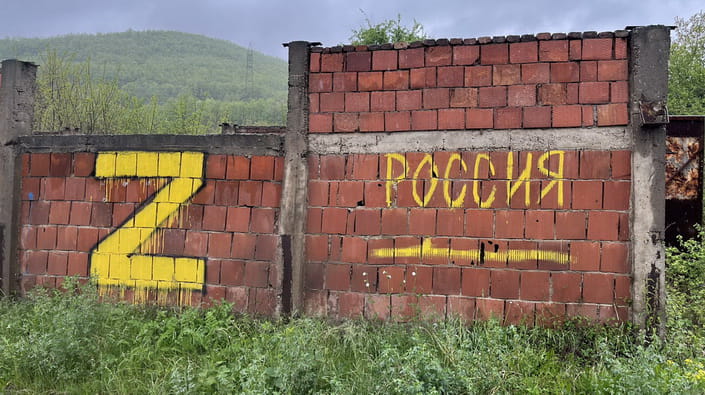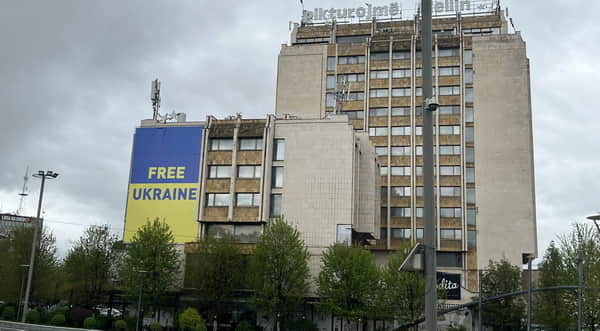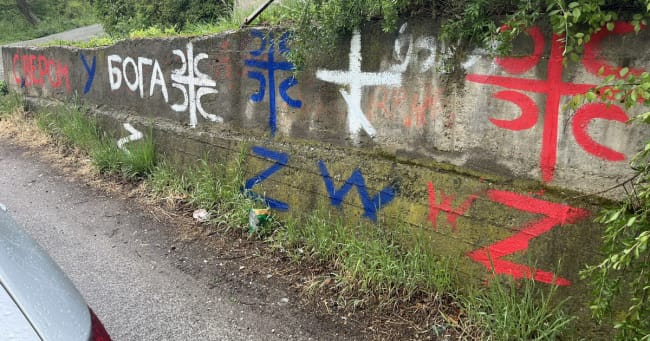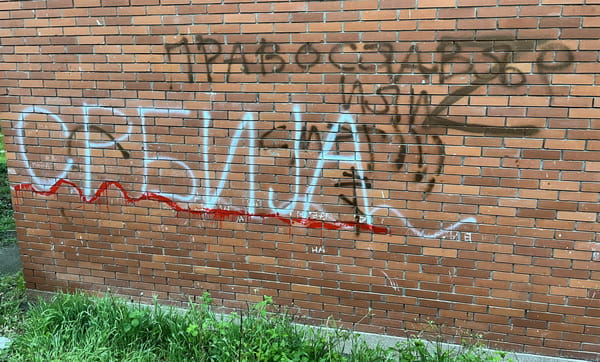Waiting for Putin: How the West’s desire to protect minorities has created a grey area in the Balkans

European countries’ readiness to reconsider the established status quo in the Balkans and admit the partially recognised country of Kosovo to the Council of Europe has already sparked a new escalation in the region.
According to Pristina, Serbia has resumed its discrimination against Kosovo citizens who cross the Serbian border.
At the same time, a referendum on early local elections in the north of Kosovo, which is largely populated by ethnic Serbs, was effectively disrupted. Serbia had long been pushing for the results of the previous elections to be overturned, but when the West forced Kosovo to make these concessions, Kosovo Serbs suddenly decided to escalate.
What’s happening in the region?
Why can’t Kosovars and Serbs reach a compromise, even with all the efforts being made by Western mediators?
And is it possible that Serbia will decide to escalate the conflict by trying to turn it into a flashpoint (spoiler alert: it has already tried)?
European Pravda travelled to Kosovo to find the answers to these questions. In this article, we’ll try to find out why the West’s approaches have only exacerbated the crisis in the region.
Vučić’s hybrid attempt
"We have to be ready for worst... There are several elements that indicate that this could be possible. One of them is the deployment of troops around the border with Kosovo. Serbia has some 48 bases on the border to Kosovo which have the name "forward operating bases", with altogether around 6000 soldiers. In the same time Serbia is a strong pro-Russian satellite in the Western Balkans, and we know that it is in the genuine interest of Russia to start another conflict even closer to the EU," says Besnik Bislimi, First Deputy Prime Minister of Kosovo, replying to the EuroPravda question, whether war actions can resume one day.
the quote was corrected after article was published.
Bislimi is referring to events that took place in Banjska, a village in northern Kosovo, in September last year. It all started with a clash with the police that ended with one policeman being shot dead. The clash escalated into a counter-terrorism operation.
The attackers – several dozen of them – took refuge in a nearby monastery. The Kosovo police were forced to abandon their assault because of the high risk of civilian casualties – there were many pilgrims in the monastery, in addition to local residents.
"This situation showed that the lives of all our citizens, regardless of ethnicity, are important to us. The storming of the monastery could have led to numerous civilian casualties, so we had to abandon it," says Kosovo’s Defence Minister Ejup Maqedonci.
Although most of the attackers managed to flee to Serbia, the attempt to undermine the situation clearly failed.
The key point is that Milan Radoičić, then vice president of the Serb List – the party that represents the Serbian community in Kosovo – was behind this destabilising attempt. The Serb List has a reputation for representing the interests of Serbian President Aleksandar Vučić’s party in Kosovo.
Ejup Maqedonci lists the key signs that suggest that Serbia was behind the attack.
"They had weapons that are in service with the Serbian army – moreover, these people were specially trained, living in Serbian army barracks. It seems we were dealing with an attempted hybrid attack to capture the north of Kosovo – something similar to what Russia did in 2014 in Crimea and Donbas," he says.
But most importantly, the Besnik Bislimi emphasises, the West agrees with the evidence that this was a hybrid attack that had its roots in Serbia’s senior leadership.
This was one of the key arguments for changing the EU’s position, particularly with regard to Kosovo’s accession to the Council of Europe – the country is expected to become a full member in May.

Captive to propaganda
Usually, when people talk about north Kosovo, they think of Mitrovica, a place that has come to symbolise the confrontation between Serbs and Albanians. In Ukraine it is known for an infamous mural supporting the annexation of Crimea which includes the slogan "Kosovo is Serbia – Crimea is Russia".
However, our trip to Banjska showed that pro-Russian symbols are proliferating deeper into the region. There are numerous letter "Z"s (a symbol of Russia’s invasion of Ukraine) and calls for Russia to save the Serbs from "Albanian occupation".
And that isn’t surprising. The local Serbs, living in an information bubble, don’t see the current war as a war against Ukraine, but as the long-awaited uprising against Western hegemony – the uprising that Kosovo Serbs hope will push back Serbia’s borders and bring them home.

"Serbian propaganda is very closely intertwined with Russian propaganda," says Kosovan journalist Jeta Xharra, who specialises in countering Russian disinformation in the region. "In particular, parallels are drawn between Kosovo and Ukraine – they say that Kosovo Serbs are being destroyed in the same way that Donbas is, and therefore they need to be saved."
And this propaganda is extremely effective! It is the reason why there has been no proper local government in northern Kosovo for nearly two years.
In 2022, during the latest protests against central government decisions, all the local MPs in northern Kosovo resigned. The central government announced new elections, but Belgrade urged Serbs to ignore them, and they did.
The unprecedentedly low turnout, with only a few ethnic Serb votes, called the legitimacy of the new local authorities into question – even though they were elected by the letter of the law.
Eventually, under pressure from the West, Pristina agreed to early elections – or more precisely, to hold a referendum in which the people of northern Kosovo could express their opinion on the need for new elections.
However, the referendum failed as, under pressure from Belgrade, local Serbs once again stayed away from the polls.
This story shows that despite the rhetoric, the Serbian authorities have no interest in resolving the situation.
Rather, Serbia wants a permanent conflict that enables it to shout about minority rights in Kosovo being infringed and the undemocratic nature of the Kosovo government to the rest of the world.
And so far, it has succeeded brilliantly!
Pressure through social media
But the Serbian authorities have more than just propaganda at their disposal.
This is clear from the situation with the police in northern Kosovo. In 2022, police officers resigned along with the local MPs.
The police in northern Kosovo are now led by Lieutenant Colonel Veton Elshani. To be more precise, Elshani holds the position of deputy head of the police, because according to agreements, the police in northern Kosovo must be headed by an ethnic Serb. However, no such person has been found yet, so an ethnic Albanian is temporarily in charge.
There’s another agreement that is much more difficult to fulfil: the ethnic composition of the police must correspond to the ethnic composition of the population of the municipalities where they work. That means that Serbs should make up about 90% of the police force in northern Kosovo. However, at present only about 40 of the 350 police officers are Serbian.
Lieutenant Colonel Elshani adds that about 30 other police officers are representatives of other ethnic minorities: they are not Serbs, but they are not Albanians either. However, it is telling that not many of the police officers are local Serbs – most of them come from Serb communities in other regions of Kosovo.
Unlike in the north, these communities have no illusions about a possible return to Serbia, and this encourages them to integrate into Kosovan society.
Why are local people reluctant to go to the police?
Elshani attributes this to pressure – not from society, but from Serbian institutions.
"It so happens that in the north of Kosovo, Serbia funds the work of two social sectors: education and healthcare. And we know of cases where Serb police officers or their family members have been discriminated against when applying to these institutions, precisely because they work for the Kosovo police," he explains.
Control over the social sphere, along with propaganda, are tools Belgrade can use to force Kosovo Serbs to follow its instructions: first ignore the elections, then demand re-elections, and then ignore them too.

Minority rights or state security?
Belgrade’s key demand (at least officially) is for the Kosovo authorities to consent to an Association of Serbian Municipalities being set up. And in this the Serbian authorities are supported by the West, as they have promised that the association would not become a basis for separatism, but would operate exclusively within the constitutional framework of Kosovo.
The Kosovo government does not agree with this logic.
"If we had good relations with Serbia, then the establishment of such an association would not be a problem for us. But we see that the Serbian minority often does not make use of the rights it currently has," acknowledges Besnik Bislimi.
But this gives rise to the question: is it possible for Kosovo Albanians and Serbs to coexist in one state?
Or perhaps Donald Trump was right when he proposed a peace plan during his presidency, a key part of which was to be a territory swap – the Serb-populated north of Kosovo in exchange for several Serb municipalities with a predominantly Albanian population.
It is possible that Trump will return to the White House and put forward this proposal again.
But in Pristina, such a proposal is unacceptable. "This plan does not solve problems but creates new ones for the entire region. The precedent of changing the border in the Balkans could be very dangerous and could start a new war," Donika Gërvalla-Schwarz, the foreign minister and second deputy prime minister of the Kosovo government, points out.
The alternative, she says, is "the extremely complex work of integration".
"We have no problems with our citizens of Serbian origin. We are a democratic country and we are ready to respect their rights. Instead, we have problems with the Serbian government and its president, Aleksandar Vučić, for whom the situation around the Kosovo Serbs is a tool to maintain his power," Gërvalla-Schwarz says.
However, even after the events in Banjska, the West’s position remains unchanged – it still hopes that new rights for the Serbian minority will ease tensions in Kosovo.
That means the Kosovo authorities are right to prepare for a new hybrid attack – despite the failure in Banjska, and the failure to block Kosovo’s accession to the Council of Europe, President Vučić retains powerful tools for attacking Kosovo.
After all, as every single person who spoke to European Pravda in Kosovo mentioned, Vučić began his political career as the Minister of Information in Slobodan Milošević’s government, and thus is highly skilled at organising psyops.
But most importantly, new hybrid attacks are possible because the EU and the US still cannot see the line between the rights of ethnic minorities and the right of states to protect national interests.
Yurii Panchenko
European Pravda Editor, from Kosovo
